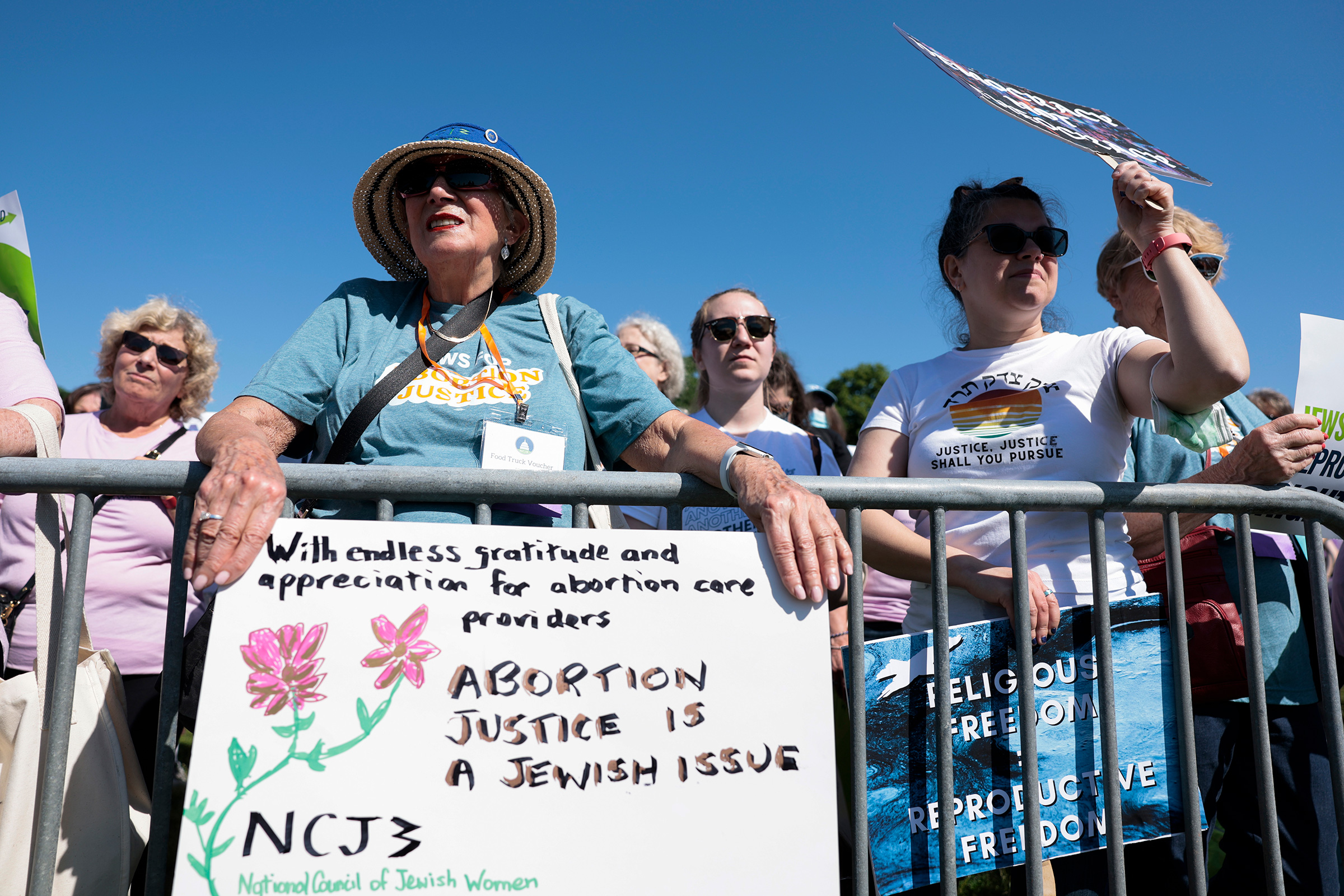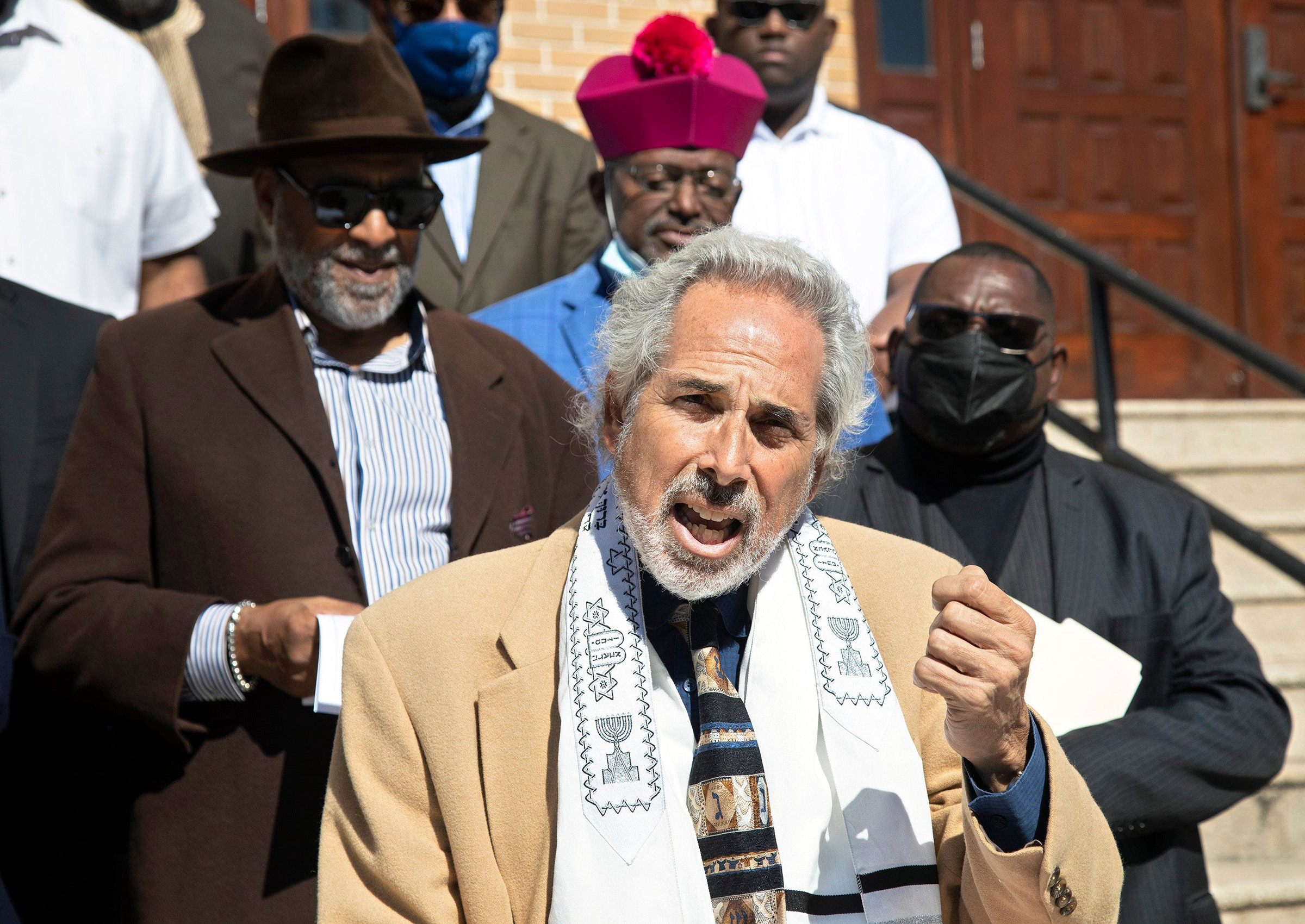
When Florida passed a law this spring that bans most abortions after 15 weeks of pregnancy, Rabbi Barry Silver was furious. And when it looked like the Supreme Court was likely to overturn Roe v. Wade, which would allow such bans to take effect, he decided he needed to act. Silver’s progressive synagogue, Congregation L’Dor Va-Dor in Palm Beach County, sued the state of Florida in June, arguing that the anti-abortion law infringes on religious liberty.
Judaism has viewed abortion as morally acceptable—and even required in some circumstances—for thousands of years. In contrast to some Christian beliefs that say life begins at conception, Jewish law says that life begins at birth, and that the fetus is part of the pregnant person’s body. This is widely understood to mean that the pregnant person’s rights take precedence, and that if the fetus endangers the pregnant person’s life or health, Jewish law would require them to have an abortion.
“The First Amendment, which is the first one that they enacted, upon which all other freedoms are based, was designed to prevent the exact type of thing that we see now: the merger of a radical fundamentalist type of Christianity with the state,” Silver, who is also a civil rights lawyer and a former Democratic Florida state legislator, tells TIME. “This law criminalizes the practice of Judaism.”
It’s unclear if Silver’s lawsuit will prevail, though some legal experts say it raises legitimate points. “There’s a strong argument that [courts] would also have to grant a religious exemption given the requirements of Jewish law,” says Michael Helfand, a professor of religion and ethics at Pepperdine University Caruso School of Law.
Experts think it will be the first in a wave of challenges to abortion restrictions on grounds of religious freedom in the wake of the Supreme Court’s abortion ruling in June. Rachel Laser, the CEO of the non-profit Americans United for the Separation of Church and State (AU), says she believes there are “very strong” legal arguments that abortion bans violate the First Amendment right to the free exercise of religion and the separation of church and state. Laser says her group is readying its own litigation on the issue that could come later this summer or early fall, but would not comment on where she plans to file suit. Other groups, including the National Council for Jewish Women (NCJW) and Catholics for Choice, tell TIME they are also exploring getting involved in legal challenges against anti-abortion laws.
As the first such lawsuit to be litigated after the Supreme Court’s decision in Dobbs v. Jackson Women’s Health Organization, Silver’s is a test case for how to fight abortion restrictions on religious freedom grounds. The synagogue’s lawsuit challenges Florida’s law under the state’s constitution, rather than under the U.S. Constitution, as most coming challenges to abortion restrictions are expected to do. The move is strategic: While the Supreme Court declared there is no federal right to abortion, some state constitutions offer their own protections for abortion, and in many places, abortion rights advocates and state officials are at odds over whether anti-abortion legislation can be enforced.
Lawsuits like Silver’s will test two of the core tenets of many conservative courts and state governments: muscular religious freedom protections and anti-abortion sentiment. Many of the states that have heightened religious freedom protections, for example, like Oklahoma and Louisiana, also have the strictest abortion restrictions in the country. And lawyers expect it’s only a matter of time until faith groups find a case that could make it back to the same U.S. Supreme Court that both struck down Roe and has been sympathetic to cases arguing in favor of religious freedom.
“Win, lose, or draw, the lawsuits draw attention in a very dramatic fashion to the fact that these laws reflect one particular set of views that’s far from universally shared,” says Marc Stern, the chief legal officer of the civil liberties advocacy organization the American Jewish Committee. “They raise the hard question of whether this is an appropriate way in a pluralistic society to legislate.”

Religion and abortion
The Florida lawsuit states that in Jewish law, abortion “is required if necessary to protect the health, mental or physical well-being of the woman,” among other reasons. “As such, the Act prohibits Jewish women from practicing their faith free of government intrusion and thus violates their privacy rights and religious freedom,” the lawsuit continues.
Florida’s ban on abortions after 15 weeks of pregnancy has narrow exemptions in cases where ending the pregnancy is necessary to save the woman’s life, avert a “serious risk” of “irreversible physical impairment,” or if the fetus has a fatal abnormality. But “how Judaism understands a medical danger and a medical emergency is far broader than what is happening in practice,” says Rabbi Danya Ruttenberg, scholar in residence at the National Council of Jewish Women. “There are absolutely cases when Jewish law would demand—would say that it is a commandment— to have an abortion, and the law of the land would say you are forbidden from doing so.”
Similar to the U.S. Constitution, Florida’s constitution says there “shall be no law respecting the establishment of religion” or “prohibiting or penalizing the free exercise thereof,” so long as it is consistent with “public morals, peace or safety.”
Silver argues the abortion ban violates both prongs of the law, by preventing Jewish people from practicing their faith and favoring a particular religious view on abortion above others. But not all Jewish legal experts agree. Howard Slugh, general counsel of the Jewish Coalition for Religious Liberty, which filed a brief in support of Mississippi in the Dobbs case arguing the Free Exercise Clause does not suggest a right to an abortion, says he thinks “the accusation that the only motivation for wanting to [enact an abortion restriction] is religious doesn’t remotely pass the smell test.”
While there are Americans who oppose abortion for secular reasons, Christian organizations have led the push to overturn Roe and add abortion restrictions for decades, and the anti-abortion movement has grown more vocal about its ties to Christianity over time, says Mary Ziegler, a law professor at the University of California, Davis and an expert on abortion history, politics, and law. In the 1970s, the anti-abortion movement was often led by Catholics. As evangelicals joined the cause and a wider variety of Christians got involved, they became more comfortable describing themselves as a faith-based movement, opening meetings with prayers, and mentioning God or Jesus.
In April, Florida’s Governor Ron DeSantis, a Republican, signed the 15-week abortion ban into law during an event at Nación del Fe, an evangelical Christian church, in Kissimmee, Fl, where state legislative leaders explicitly invoked God in explaining their support for the new law. “The argument that it has nothing to do with religion is just weaker, period, than it was when Roe came down,” Ziegler says.
‘We do this work because of our faith, not in spite of it’
Other faith organizations are already preparing their own challenges to restrictive abortion laws.
NCJW, which has long been involved in advocating for reproductive health care access, is planning lawsuits based on religious freedom claims in a variety of states in the coming months. “We have been working with legal teams to explore lawsuits focused on religious freedom to stand up for our community and to make it known that Jews support access to abortion,” says CEO Sheila Katz. “It is inappropriate for states and our governments to be declaring when life begins according to one narrow interpretation of one tradition.” Both NCJW and Americans United for a Separation of Church and State have been in touch with Silver in Florida, and Katz says her organization is talking with Muslim advocates about religious freedom concerns as well.
Some future lawsuits may try a different tactic: While the Florida lawsuit was brought by Silver’s synagogue, legal experts say the challenges might have more success if they are brought by pregnant individuals who argue that their right to personally practice their religion is being violated by an abortion ban. NCJW is open to supporting such plaintiffs, Katz says, and she expects to see more groups from the Jewish community getting involved in lawsuits soon.
Catholics for Choice, a group that supports abortion rights, is also planning to sign on to amicus briefs challenging abortion laws in Florida and Michigan in the near future. While the Catholic Church officially opposes abortion, Catholics for Choice sees its support of abortion rights as grounded in the church’s teachings about the importance of the individual conscience, religious freedom, and social justice, says Catholics for Choice President Jamie Manson. “We do this work because of our faith, not in spite of it,” she says.
Silver says he has also heard from other faith leaders, including Christians, about potentially filing their own lawsuits. He recently launched an initiative called HEART, or Helping Enforce Abortion Rights Today, to help other religious organizations and atheists push back on anti-abortion legislation. Silver posted a copy of his complaint online so that others could use it as a template in their own challenges.
“We know in any grassroots movement, you don’t just file a lawsuit and all of a sudden you win. You do it, somebody else does it, and then there’s a growing momentum,” Silver says. “So what we hope for is that people will take this and run with it. And people will realize that they don’t have to just sit back powerless and do nothing, that they can fight back.”
More Must-Reads From TIME
- The 100 Most Influential People of 2024
- The Revolution of Yulia Navalnaya
- 6 Compliments That Land Every Time
- What's the Deal With the Bitcoin Halving?
- If You're Dating Right Now , You're Brave: Column
- The AI That Could Heal a Divided Internet
- Fallout Is a Brilliant Model for the Future of Video Game Adaptations
- Want Weekly Recs on What to Watch, Read, and More? Sign Up for Worth Your Time
Write to Madeleine Carlisle at madeleine.carlisle@time.com and Abigail Abrams at abigail.abrams@time.com